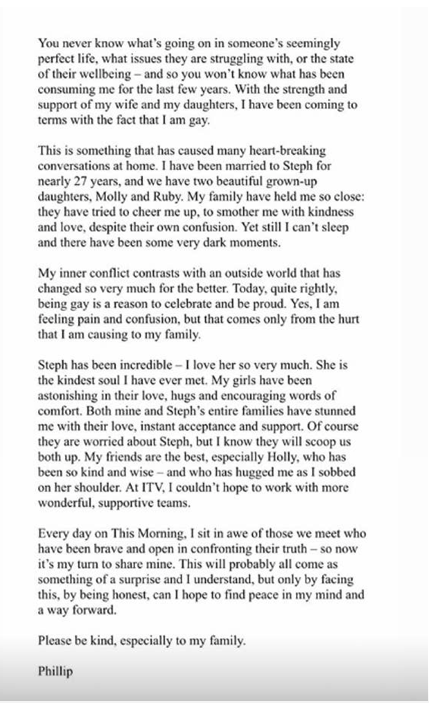Earlier this month, This Morning presenter Phillip Schofield publicly came out as gay in a personal statement shared on Instagram. As one of the most recognised faces on British television, given his reputable three-decade-long career at the forefront of daytime television, Schofield’s statement made waves throughout the country.
Though most reactions have been positive and supportive, certain negative reactions to Schofield’s announcement demonstrate the specific issues that continue to surround the act of coming out, making it more difficult for LGBT+ identifying individuals to live their truths.
So, how should we react when someone comes out? From some of the more rogue responses to Schofield’s statement, we can certainly learn a lot about how not to react.
The first reaction to avoid is perhaps the most common: ‘we already knew!’ Countless tweets and comments on other social media platforms claim to have already known Schofield was gay, suggesting his mannerisms and appearance made his sexuality obvious to audiences. To claim Schofield’s sexuality was ‘obvious’ does nothing but perpetuate dangerous homophobic stereotypes and myths surrounding LGBT+ identifying individuals. Engaging in speculation and gossip surrounding an individual’s sexuality (particularly an individual we do not personally know), is unacceptable. Even suggesting to have known the truth about an individual’s sexuality in a positive way, perhaps in celebration of someone’s coming out, is also incredibly distasteful. To do so means to disempower the individual concerned and rewrite the narrative from your own perspective, lauding the fact that you knew before everyone else.
On- screen partner Holly Willoughby interviewed Philip on This Morning about his statement (Image: @schofe Instagram).
In a similar way, to say coming out ‘shouldn’t matter’, or that Schofield’s announcement was unnecessary, not only silences gay people in their most vulnerable moments, but also perpetuates the false narrative that homophobia is no longer a major issue to tackle in today’s society. Though the past decades have seen an increasing move towards social progressivism, especially concerning LGBT+ issues, homophobic prejudices and actions continue to exist. Whilst this continues to be the case, identifying as gay can certainly be viewed as something to be proud of, and publicly coming out should be acknowledged as the incredibly brave act it is.
Of course, in some instances (for example, with close friends), it can be reassuring to be told your sexuality is not definitive of yourself, or that those surrounding you already knew. However, to apply this reaction to a celebrity, whom viewers have no personal connection to, feels distasteful. Schofield had shared perhaps the most vulnerable aspect of his life with thousands of people and in the process, has opened himself up to several avenues of judgement – to decide his coming out is not necessary is objectionable. Not only this, but in a position of influence, Schofield has the capacity to make several gay viewers feel even slightly more comfortable in their own skin, something which is incredibly significant and has already been proven to make positive change.
A third reaction to avoid, and perhaps the most dangerous, concerns Schofield’s family. Schofield’s coming out has prompted hundreds of uninvited opinions on his twenty-seven marriage to Stephanie Lowe and the validity of his relationship with his two adult daughters. Despite the continuous reiterations of a relationship consisting of nothing support following Schofield’s coming out, several online comments have accused Schofield of deceiving his wife and children throughout his marriage. Several memes and opinion pieces have cropped up in the days following the announcement, with several suggesting they would be deeply unhappy if their own partner were to come out as gay after years of marriage. Not only is this unsolicited judgement inappropriate, but again, reinforces dangerous attitudes towards the LGBT+ community, suggesting it would be better for gay people to closet themselves for life in order to make others comfortable.
Is there a correct way to react when someone comes out? Perhaps there is no uniform formula that can be applied to every individual, but there is certainly an underlying message that remains prevalent in each instance – coming out is an incredibly powerful act that belongs to the individual concerned and no one else. When someone makes the decision to come out, we reassure, we avoid making judgements, and we certainly avoid controlling a narrative that is not ours to dictate.
Featured Images: @schofe instagram

